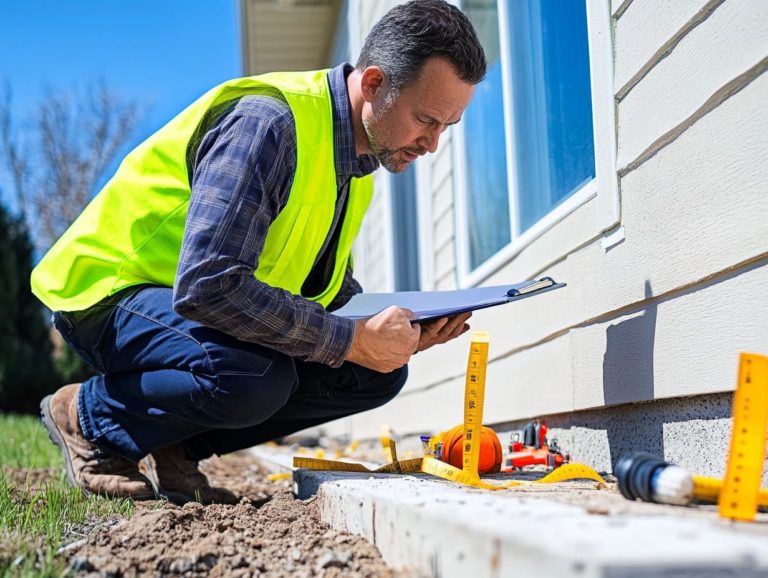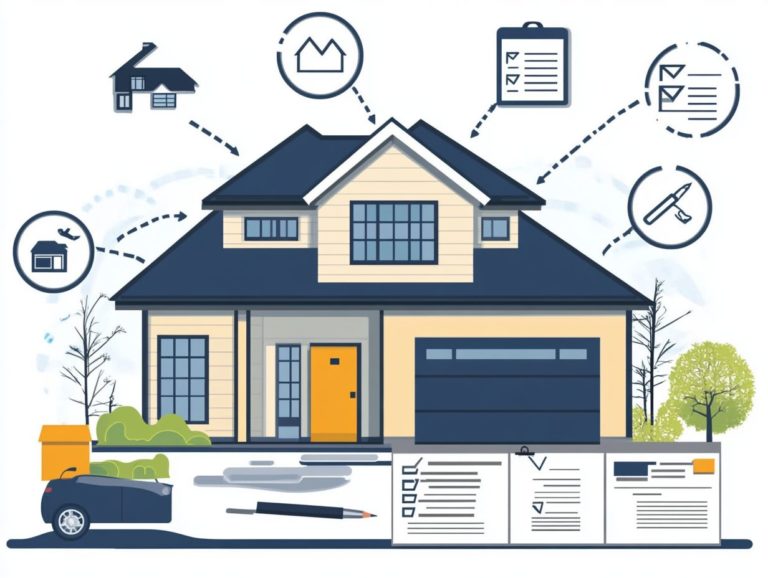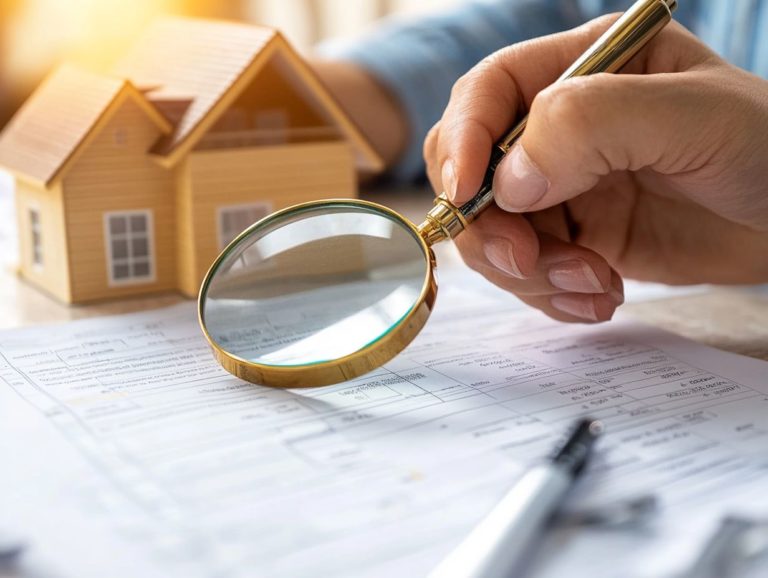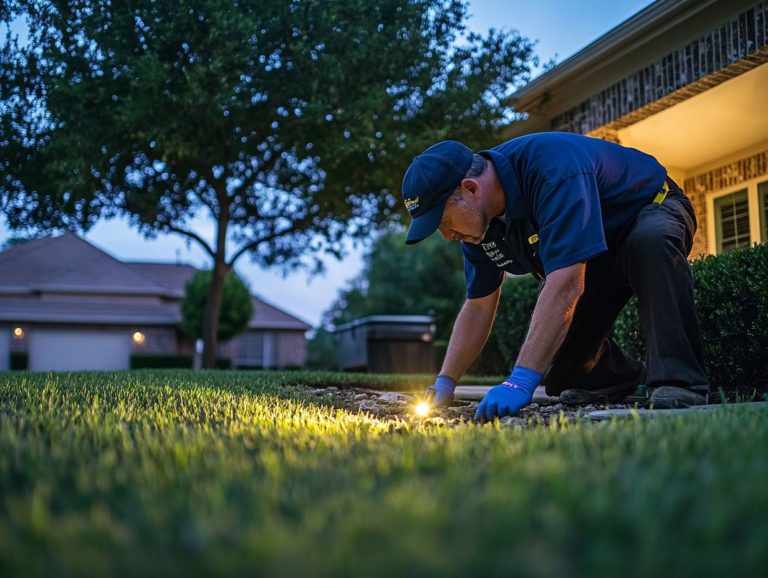How to Handle Post-Inspection Repairs
Navigating post-inspection repairs can be daunting. When a home inspection reveals issues, you need to act fast.
This article covers everything about these repairs, including what they involve and common examples you may face.
Consider key factors before diving into repairs. Weigh the pros and cons of tackling them yourself or hiring professionals.
This guide empowers you to negotiate with sellers effectively. You ll feel confident approaching post-inspection repairs.
Contents
- Key Takeaways:
- Understanding Post-Inspection Repairs
- Common Repairs After Home Inspections
- Factors to Consider Before Making Repairs
- DIY vs Professional Repairs
- Negotiating Repairs with the Seller
- Ensuring Quality Repairs
- Frequently Asked Questions
- What are post-inspection repairs?
- Do all homes require post-inspection repairs?
- Who is responsible for post-inspection repairs?
- What types of repairs are typically needed after a home inspection?
- Should I hire a professional to handle post-inspection repairs?
- What if I am not satisfied with the post-inspection repairs?
Key Takeaways:
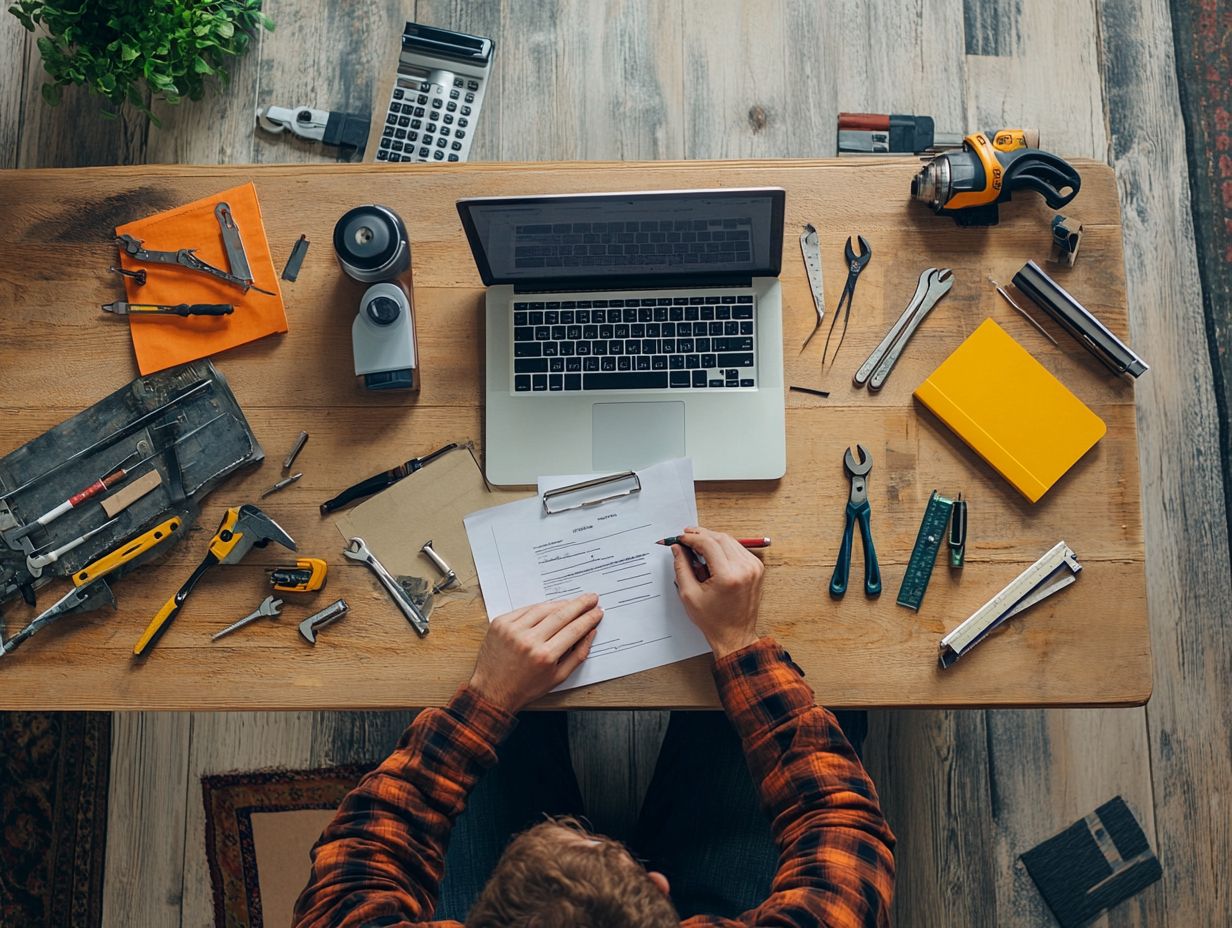
Understand post-inspection repairs and their importance in the home buying process.
Consider factors such as cost, time, and necessity before deciding on DIY or professional repairs.
When negotiating with the seller, be prepared with evidence and communicate clearly to reach a successful agreement.
Understanding Post-Inspection Repairs
Post-inspection repairs are crucial for buyers and sellers in the Portland metro area, especially when considering what to do about unfavorable inspection results. These repairs set the stage for effective negotiations during a home purchase.
After an inspection, you ll face various issues that could affect your decisions. These might include necessary repairs or potential closing cost credits.
This stage demands a thorough evaluation of the inspection report. Clear communication with your agent and the seller is key to a satisfactory resolution.
What are Post-Inspection Repairs?
Post-inspection repairs are the important fixes identified during a property inspection that you must address before closing the sale. To effectively handle these, it’s crucial to understand how to negotiate repairs after inspection, which can include urgent issues like HVAC failures, plumbing leaks, and foundation cracks.
As a buyer, inspections reveal problems that could affect your investment. If serious issues arise, you may need to negotiate repair costs or seek credits, which can change the sale dynamics.
Sellers must address these issues to boost their property s appeal in a competitive market.
Common Repairs After Home Inspections
Repairs after home inspections vary widely but usually involve critical fixes. These ensure the property meets safety and livability standards.
This is vital in the competitive Portland market, where buyers know what to look for.
Examples of Typical Repairs
Typical repairs often involve foundational fixes, plumbing leaks, electrical system updates, and HVAC maintenance.
As a homeowner, you may need to repair leaking faucets or fix roof damage. These tasks significantly impact your property’s overall condition.
Outdated electrical panels may also need an upgrade to meet safety standards.
During negotiations, sellers might offer concessions to ease repair costs. They could provide credits or include a home warranty, which makes the property more appealing.
Factors to Consider Before Making Repairs

Before making repairs listed in an inspection report, evaluate several key factors carefully.
Consider the costs, time, and necessity of each repair. This will help you navigate residential real estate with confidence.
Cost, Time, and Necessity
Analyzing the cost, time, and necessity of repairs is crucial for you, whether you’re a buyer or a seller. It allows you to make informed decisions during negotiations.
As a buyer, assess the urgency of repairs. Think about how each issue affects your living experience and the property’s long-term value. For example, prioritize major repairs like roof replacements or plumbing upgrades to save yourself from future headaches and expenses.
On the flip side, if you’re a seller, it s wise to approach repair negotiations strategically. Talking openly about necessary repairs showcases your honesty and positions you as reasonable and cooperative qualities that often attract buyers.
Finding a balance between addressing immediate concerns and highlighting the property’s overall value can boost your competitiveness in the bustling residential real estate market.
DIY vs Professional Repairs
When you encounter post-inspection repairs, you’ll need to decide between tackling the repairs yourself or hiring professionals. Each option comes with its own set of advantages and challenges, especially within the realm of real estate transactions, including negotiating repairs after home inspection.
Pros and Cons of Each Option
Evaluating the pros and cons of DIY repairs versus professional repairs is essential for determining the best path forward. Taking on DIY repairs can lead to substantial cost savings, allowing you to tap into your own skills and ingenuity. This approach fosters creative problem-solving and delivers a gratifying sense of accomplishment upon finishing a task.
However, there s a gamble involved; lacking adequate knowledge might result in less-than-desirable outcomes, potentially exacerbating the original issue.
On the flip side, choosing professional repairs guarantees expertise and adherence to relevant regulations, ensuring that the job meets high-quality standards. That said, this assurance often comes with a steeper price tag, which might give you pause before reaching out for professional help.
In the end, weigh your options carefully. Consider both cost and quality to ensure a satisfying repair experience.
Negotiating Repairs with the Seller
Negotiating repairs with the seller is an essential component of the home buying journey. It significantly influences your closing costs and overall satisfaction with the property. Engaging in this dialogue helps you address any concerns and ensures that your investment aligns with your expectations.
Tips for Successful Negotiations
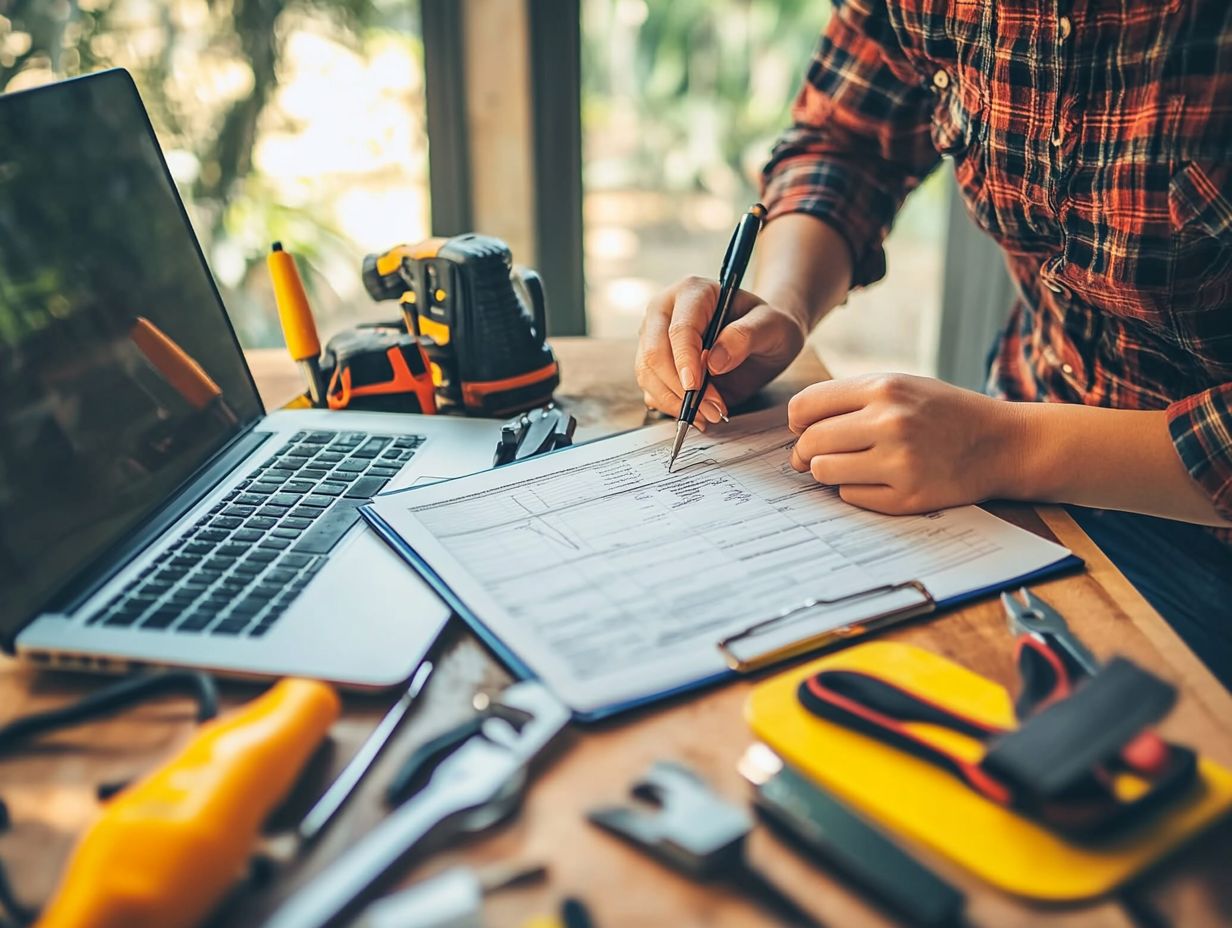
To navigate successful negotiations regarding repairs, adopt strategic approaches that leverage the insights gleaned from the inspection report. This fosters a constructive dialogue with the seller.
By establishing clear priorities, you can effectively communicate which repair items matter most to you, ensuring discussions remain focused and productive. Present evidence from the inspection report, emphasizing tangible issues that require attention, as this can bolster your position.
Remain open to compromises, such as requesting seller concessions or repair credits, to lead to a mutually beneficial outcome. This flexibility demonstrates your willingness to collaborate and enhances the likelihood of arriving at an agreement that satisfies both parties’ needs.
Ensuring Quality Repairs
Ensuring high-quality repairs is vital for buyers and sellers alike. This crucial step affects not just the property s value but also its safety for years to come.
How to Verify and Monitor Repairs
Verifying and monitoring repairs requires a step-by-step process to ensure that all modifications meet quality standards and align with the original inspection report. This process is crucial for protecting your investment and offers priceless peace of mind.
Start by conducting thorough walkthroughs at various stages of the repair process. This allows you to assess the quality of the work firsthand. Engage with contractors and request regular feedback to clarify any concerns and maintain open lines of communication.
Creating timelines for each repair task is essential. It sets clear expectations and facilitates routine check-ins on progress. By actively monitoring ongoing work, you ensure that requirements are being met and that everyone keeps their promises, leading to a highly satisfactory conclusion.
Frequently Asked Questions
What are post-inspection repairs?
Post-inspection repairs refer to repairs needed after a home inspection has been completed. These repairs are usually identified by the home inspector and may be necessary for the home to pass inspection.
Do all homes require post-inspection repairs?

No, not all homes will require post-inspection repairs. It ultimately depends on the condition of the home and the findings of the inspection. Some homes may need minor repairs, while others may require more extensive work.
Who is responsible for post-inspection repairs?
The responsibility for post-inspection repairs varies depending on the terms of the home sale contract. Sometimes the seller is responsible for making the repairs, while in other cases, the buyer may take charge. It’s important to know what to do after a home inspection and carefully review the contract to determine responsibilities.
What types of repairs are typically needed after a home inspection?
The types of repairs needed can vary greatly. Common repairs include fixing electrical or plumbing issues, repairing or replacing damaged roof shingles, and addressing any safety concerns identified by the inspector.
Should I hire a professional to handle post-inspection repairs?
In most cases, it is recommended to hire a professional contractor or handyman to handle these repairs. They have the necessary skills and experience to ensure the work is done properly.
What if I am not satisfied with the post-inspection repairs?
If you are not satisfied with the repairs, communicate your concerns with the seller or their agent. Depending on the contract’s terms, you might negotiate for additional repairs or compensation to cover the costs.
For further assistance, consider contacting a professional or reviewing your inspection report to ensure all necessary repairs are addressed.

